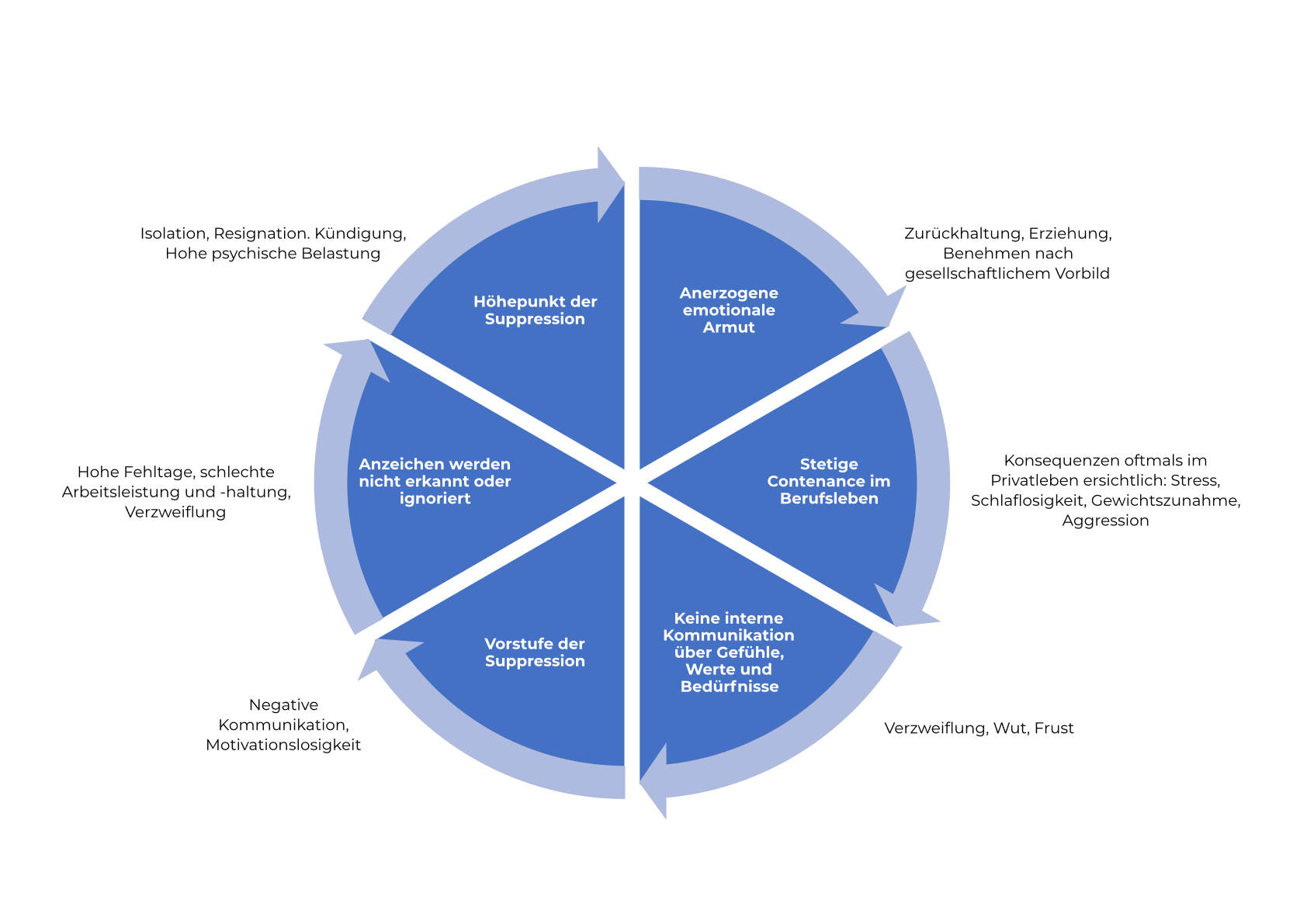Like emotional poverty endangers business success and what you can do about it can
They exist: Emotions in everyday working life. An appreciation of these is unfortunately given in the fewest cases. We are all familiar with the consequences: People become dull, no longer show any feelings and isolate themselves.
We humans not only have an individual physiognomy, we also leave behind a very special and personal emotional fingerprint in life.
This fingerprint describes the way in which we react as a human being to situations in daily life. In this way, we can offer a strong regeneration type and are characterized by particularly pronounced resilience. stand out. We can likewise be very intuitive and respond to extremely sensitive way to “read” other people’s feelings, words or gestures.
Sometimes we also meet people who have a special intelligent emotion regulation. We then often refer to them as “calm” and “composed” in situations where we would have “hit the roof” long ago. To regulate emotions well, that is, to decide at the decisive moment whether a rational or emotional reaction would be purposeful and appropriate. However, this does not always succeed and can then even be harmful.
Such a trade-off is harmful if the response is always means “restraint”.
Emotions cannot be permanently suppressed
Each of us knows the situation when you spend years with People (be it friends, family or work colleagues) at a (meeting) table whose attitude, behavior and verbal expressions correspond to their own world view. contradicted each other in every respect. However, since you can’t see the social relationship you exercise emotional restraint, allow yourself to be The young man does not show any outward signs and remains silent. Such behavior is also called “Suppression.
You can probably guess what such behavior leads to, because emotions cannot be suppressed for a lifetime. At some point, the internal pressure is too high and the well-practiced facade starts to crack. In one, these cracks express themselves through an emotional outburst accompanied by anger, sadness, and loud expressions. For the other, this process happens internally and manifests itself through despair, sadness and withdrawal, which third parties often experience as depression or burnout.
But why am I telling you this?
Have you ever wondered perhaps:
- Why sick days are increasing every year?
- Why the mental illnesses (depression, burnout, personality disorders) and related physical damage (overwork disorder, aggression, sleep disorders, weight gain, addiction) are on the rise?
- Why communication in companies is getting worse and worse and that despite “chakka-chakka seminars”, which are more for entertainment than prevention?
The answer is quite simple: Because our working world is still busy doing damage regulate instead of taking preventive action and identifying the cause.
Learn to value emotions
We humans are emotional beings and we desire to be in the job not only recognition and appreciation, but also emotional closeness.
If someone is extremely uncomfortable with a project, it is often passed over. One’s overarching nature attributes fear and weakness to this person and tells him/her that he/she needs to step out of the comfort zone for once.
This is a clear moral offense. No one should use the have the right to override the feelings of others, or to belittle.
That we can not do otherwise is not surprising, because everyone surely knows the following situations:
- A child falls to the ground and expresses that he feels pain.
Response: “It doesn’t hurt that much, Indians don’t know pain.”
- A teenager feels bullied and oppressed at school.
Response: “Then you have to fight back, everybody’s been through it, they’re not worth it.”
- A young adult feels desperate and wants to stop studying.
Response, “Come on, pinch your butt now, others have done it, follow through!”
- A young professional does not feel taken seriously, has to work for a low wage and shimmies from one temporary contract to the next.
Response: “Apprenticeship years are not master years, you just have to go through it.”
I could continue these situations indefinitely and differentiate them by gender, as there are still some variations here in the evaluation of the person and their feelings.
Do you notice here however, a pattern on?
Our evaluation of our own feelings becomes more and more important with the beginning of our own development of consciousness into question. Of course this will well-intentioned, because you want to prepare your child for life. The does not mean, however, that this is the only truth.
Break the wheel of emotional suppression
So how are we to live our entire lives dedicated to our were not allowed to trust their own feelings, now express them freely and without inhibition?
In the professional context, a simple solution has been found for this: One does not express them at all!
If women become serious and matter-of-fact in conversations, they are immediately “bossy.” If they show feelings and emotionality, they are considered hysterical. The emotionally cold person is, in turn, welcomed as an exemplary leading figure in a world of work devoid of emotion.
And so we come to the above consequences of the Suppression back and have the cause and effect of the circulation recognized.
The wheel of emotional repression:

Recognize signals in your own company
So how do I know if my company has perhaps this cycle has already unfolded?
First, the good news: the preliminary stage of suppression often manifests itself initially through a negative mood, as one feels “not seen” and seeks attention. This behavior can be very well recognized when seriously dealing with colleagues or employees.
Everyone knows that one colleague who every time… negative, for whom no project is good enough and who always complains about the external circumstances that cannot be changed.
If one recognizes such behavior, the manager should respond immediately and enter into a personal conversation.
If this does not happen, he/she will become a witness afterwards, how a small (seemingly insignificant) virus can lead to an epidemic.
Because, and here comes the bad news: feelings (especially negative ones) are transmittable, in science this process is called: “A primitive emotional contagion“.
So what can you do to stop and break this complete cycle?
- Reflect on your own feelings: Be aware that you also leave an emotional fingerprint. Their mind evaluates a particular situation and they then have to make the decision on how to react to it. In doing so, question your own “truth” and direct your gaze specifically “inward” to find out which emotions are currently moving and influencing you in your actions.
- Develop emotional intelligence: Don’t become a mere advocate of your mind, because many an evaluation of a situation is misguided. If you feel sad, confused, or angry, express it clearly in words. Be a role model and show others that there is room for this. Also mirror the feelings of others and give them the opportunity to correct your perception, because this is the only way to promote mutual understanding.
- Listen and never judge others’ feelings: if someone tells you they are distressed or overwhelmed, take it seriously. Statements like, “You could have gotten help,” are inappropriate and only show that you, as a leader, lack empathy. Recognize the courage of your employees when they open up to you and clearly name their feelings and actively involve them in finding solutions.
- Take time for the feelings of others: Projects, key figures, meetings – there always seems to be endless time for everything, but for Mourning (death in the close family = 1-2 days of leave), Dear (wedding = 1 day vacation) or Pain (illness = 6 weeks with subsequent sick pay if the patient was taken seriously in his suffering) this is obviously missing. Show foresight and you will clearly see the results. If you take the feelings of your employees seriously and also address them with concrete measures, you will find healthy, satisfied and motivated partners at eye level and not unmotivated, ” “permanently sick” and disgruntled employees who negatively influence the feelings of others and do not feel (emotionally) committed to you and your company in any way.
- Get professional support in the form of coaching: When communication is in a mess or sick days are increasing, we are already in the middle of the final phase of the emotional wheel. Now, it’s not going to do you any good to get a great speaker into the company who can give everyone a little “power”. You will never achieve a deeper change through the mind. Coaching makes feelings tangible, it is a combination of physical and psychological experience. It does you no good to simply overcome negative feelings, because this would involve violence. You need to embrace emotions, accept them, and when the time is right, let them go.
Coaching saves you a lot of time, money and effort and, on the other hand, brings you more understanding, Clarity and serenity – you just need to use it for yourself to know.
Your personal, emotional fingerprint
You too can leave an emotional fingerprint. Be perceived as a leader who can find new and sustainable ways of goes. Be attentive, emphatic and understanding.
Add to this a pinch of humor and some professional support and you have discovered that you can stop the above wheel with a quill (coaching) and not by spending years trying to make it stop with a rope (health management, employee events, chakka-chakka speakers).




